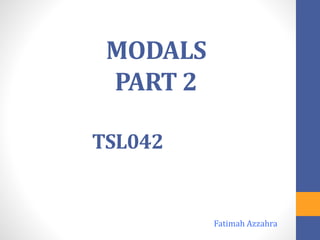
Modals - Part 2
- 2. REQUEST: CAN, COULD, WILL, WOULD, WOULD YOU MIND
- 3. 1) We use modals can, could, will and would to make a request. Eg: Can you submit your work by tomorrow? Will you come to my room? • Could and would are more polite than can and will. These are used to soften request. Eg: Could you give me a call? Would you switch off the fan? • Please is also used to make the request more polite. Notice the word order. Eg: Would you close the door please? Would you please close the door?
- 4. 2) In affirmative answer to requests, we usually use expressions such as sure, certainly, of course and no problem. Eg: A: Would you like a cup of coffee? B: Sure. (I’d be glad to). (Of course). • In negative answers, we usually apologize and give an explanation. Eg: A: Could you come to my office today? B: I’m sorry, I can’t. I have something to do later on.
- 5. REMEMBER! • Do not use would/could in response to polite requests/ Sure, I would I’m sorry, I couldn’t.
- 6. 3) We also use Would you mind + gerund to make polite requests. It is even more polite than could/would. Eg: A: Would you mind waiting? I still have some work to do. B: Not at all. (Of course not). = OK, I’ll do it. *affirmative* B: I’m sorry, I can’t. I have another appointment in half an hour. *negative answers* = apologize, explain
- 7. ADVICE: SHOULD, OUGHT TO, HAD BETTER
- 8. 1) Should and ought to are modals used to say something that is advisable. • They have the same meaning = “This is a good idea. This is good advice.” Forms: should + simple form of a verb (no to) ought + to + simple form of a verb Eg: My clothes are dirty, I should wash them. (ought to) Incorrect: I should to wash them. I ought washing them.
- 9. 2) NEGATIVE: Should + not = shouldn’t (ought to is usually not used in the negative) Eg: You need your sleep. You should not stay up late. 3) QUESTION: should + subject + main verb (ought to is usually not used in questions) Eg: A: I’m going to be late. What should I do? B: Run.
- 10. 4) The use of maybe with should & ought to “softens” advice. A: I’m tired today. B: You should/ought to go home and take a nap. A: I’m tired today. B: Maybe you should/ought to go home and take a nap. Speaker B is giving definite advice. He is stating clearly that he believes going home for nap is a good idea and is the solution to speaker A’s problem. Speaker B is making a suggestion: going home for a nap is one possible way to solve speaker A’s problem.
- 11. 5) Had better has the same basic meaning as should/ought to. • Contraction: ‘d better (usually in speaking) • Usually implies a warning (strong advice) about possible bad consequences. Eg: You’re driving too fast! You’d better slow down. ** if you don’t slow down, there could be a bad result; You could get a speeding ticket or have an accident. NEGATIVE: had better not Eg: You’d better not eat that meat. It looks spoiled. REMEMBER! Had better always refers to the present/future, never to past (even though it uses word had)
- 12. 6) In informal context, we often use oughta instead of ought to and better instead of had better. Eg: You oughta read the netiquette rules first. You better not just jump in. REMEMBER! Do not use these forms in formal writing.
- 13. EXPRESSING NECESSITY OR OBLIGATION: MUST, HAVE TO, HAVE GOT TO
- 15. EXPRESSING LACK OF NECESSITY: DO NOT HAVE TO
- 16. 1) Don’t / doesn’t have to expresses the idea that something is NOT NECESSARY. Eg: • I finished all of my homework this afternoon. I don’t have to study tonight. • Tomorrow is a holiday. Mary doesn’t have to go to class. 2) Must not expresses prohibition (DO NOT DO THIS!). Eg: • Children, you must not play with matches! • We must not use that door. The sign says “Private: DO NOT ENTER”.
- 17. 3) Must + not = Mustn’t (the first “t” is not pronounce) Eg: You mustn’t play with matches.
- 18. To be continued
